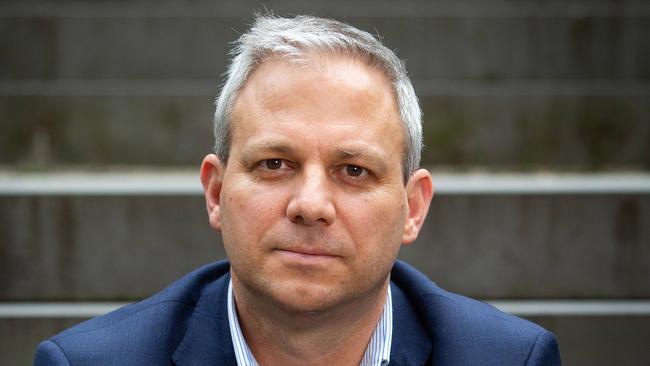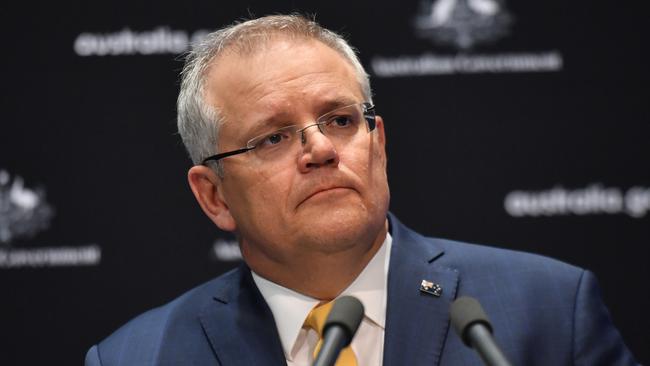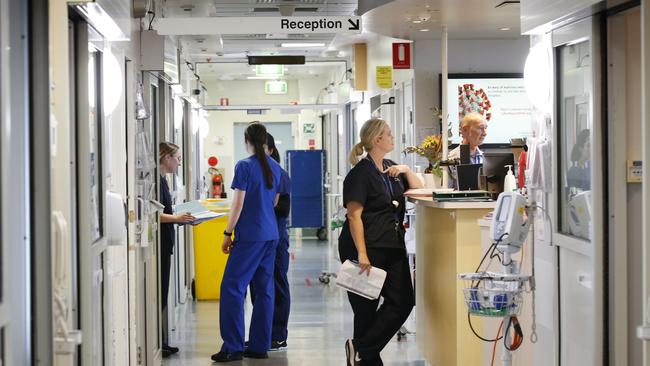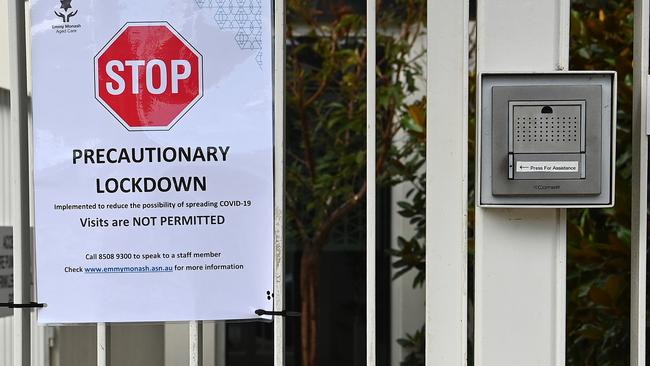Charity enters debate in plea to reopen schools
In what could be a lightning rod to push states to open schools, World Vision’s Australia’s acting CEO warns the shutdown would widen the gap between disadvantaged children and their peers, while authorities want testing ramped up to try to get staff back to work.
Coronavirus
Don't miss out on the headlines from Coronavirus. Followed categories will be added to My News.
This coronavirus article is unlocked and free to read in the interest of community health and safety. Get full digital access to trusted news from the Herald Sun and Leader for just $1 for the first 28 days.
Victorian classrooms may begin to return to normal before the end of term, as leading charity World Vision Australia calls for schools to be reopened.
In what could be a lightning rod to push states to open schools more widely, the charity’s acting CEO Graham Strong said a continued shutdown would widen the gap between disadvantaged children and their peers.
“Some disadvantaged children will be lost to the education system completely,” Mr Strong warned.
It is the first time one of the big international NGOs has waded into the political debate and it is seen as an unusually strong move by the charity.
Most schools remain open for children of key workers and vulnerable children, but that relies on students self-identifying as “vulnerable” and parents pushing for them to attend school.
“The National Cabinet must prioritise and resource the soonest return to normal school delivery as soon as practicable,” Mr Strong said.
“World Vision Australia stands ready to support the continuity of education to the best of our ability.”
It comes as new evidence shows kids have not been spreading the virus in schools, and only 2.4 per cent of infected patients in Australia have been children.

While Victorian students have been told they must learn at home if they can during term two, Chief Medical Officer Brett Sutton said he would review the situation “on a day-by-day, week-by-week basis according to how the numbers are going”.
Prime Minister Scott Morrison declared on Friday schools were “the obvious place for us to move back to normal as quickly as possible”.
A national medical expert panel has found social distancing rules, including keeping 1.5m apart and having one person per 4sq m, are not needed in classrooms.
Australian Education Union Victorian president Meredith Peace said teachers were “as keen as anyone to return to normal life, including a return to school”.
“We must plan that return carefully to ensure the safety of both staff and students,” she said.
Independent Education Union general secretary Deb James added: “We support the current arrangements continuing for the rest of term two, unless there is clear, evidence-based advice that an earlier return to classroom learning is safe for students and staff
FACILITY CLUSTER BRINGS NEW CASES TO THREE
Victoria has recorded three more confirmed cases of COVID-19 overnight, with one of those infections coming added to an outbreak at a Melbourne psychiatric facility.
The total number of coronavirus infections in the state now sits at 1346 people, with no new deaths on Friday.
One of the three new cases is an inpatient at the Albert Road Clinic and remains in their care.
The other two cases are under investigation.
Victoria’s Deputy Chief Health Officer, Dr Annaliese van Diemen, said it was still too early to speculate on when or how current movement restrictions might be lifted.
We are reviewing the current state of play at this point of time.
“At this point our advice remains the same for everybody.
“Please stay at home unless you absolutely have to.”
Dr van Diemen said patients discharged from the psychiatric clinic had been asked to self-isolate, with those who had not yet been contacted to receive phone calls this weekend.
- Kieran Rooney
DAILY CHECKS PART OF NEXT PHASE
Australia is successfully suppressing the coronavirus but authorities want to test 50,000 people a day in coming weeks to give businesses confidence to bring staff back to work.
After a week of a four-week suppression phase before restrictions can be eased, Victoria’s tracing detectives have not found any new, unexplained cases of community transmission.
Workplaces which have staff working remotely are now being encouraged to reorganise their offices to include social distancing and hygiene measures, and to draft emergency response plans for outbreaks.
“This is all about getting Australians back to work, and that when they go back to work, they and their families can feel safe,” Prime Minister Scott Morrison said.
The National Cabinet, which met on Friday, is also working on new guidelines to lift restrictions on professional and community sport.
Mr Morrison said the principles, to be drafted with the national medical expert panel, would pave the way for elite competitions to return to training and matches, as well as community competitions which are “such an important part of our way of life”.

He said individual exercise — a source of controversy in Victoria with bans on activities such as fishing and golf — would be guided by the new advice to achieve national consistency.
Mr Morrison said he wanted sport to return to normal “as soon as we can”.
Six new cases were identified in Victoria on Friday, taking the state’s total to 1343.
There are now 135 COVID-19 cases confirmed as unexplained community transmission, just three more than on April 15 when the steady rise in numbers began to slow.
Cases of community transmission — where a person tests positive but cannot be linked back to any previously known source or cluster — pose the greatest risk and indicate there are more unidentified cases circulating freely which cannot be isolated.
But the efforts of Victoria’s investigators to trace new cases have been so successful they have not only stopped the spread, but have now identified the source of previously unexplained cases so they are no longer classified as community transmissions.
Australian Chief Medical Officer Brendan Murphy said the effective reproduction rate of the virus — a key measure to determine whether restrictions can be eased — remained below one, meaning each infected patient spread it to less than one other person.

Prof Murphy said authorities wanted to test 50,000 people a day to ensure there was not widespread community transmission, even checking people in frontline occupations without symptoms.
Mr Morrison said a mobile app to automate contact tracing of cases was almost ready to be released.
He confirmed the contract for storing the data had gone to American technology giant Amazon, but insisted the company had worked with Australia on “many, many sensitive issues in terms of Australia’s data management”.
He said it would be illegal for the data to be used by anyone except state health workers tracing the spread of the virus.
Prof Murphy also indicated rules to quarantine overseas arrivals in hotels for 14 days could be in place until a vaccine was found, although people travelling from countries where the virus was not as rampant — such as New Zealand — could face more relaxed rules.
AGED CARE HOME VISITS MUST BE ALLOWED
Aged care homes have been put on notice to stop banning family and friends from visiting elderly residents.
Restrictions to slow the spread of the coronavirus mean Australians living in aged care facilities are only allowed two visitors a day, with those meetings to be kept short and not held in communal areas.
But Prime Minister Scott Morrison has hit out at nursing homes that have completely shut down access for family and friends wanting to visit.
Speaking after on Friday’s National Cabinet meeting, he said — “should we not see an improvement in this area” — the Federal Government would consider forcing aged care homes to seek a formal exemption if they wished to put tougher measures in place.
Mr Morrison said further limits on visitors were “entirely sensible” in the event of localised outbreaks, seen in recent days in northwest Tasmania and western Sydney.
“But more broadly, having people stuck in their rooms, not being able to be visited by their loved ones, carers and other support people, that’s not OK,” he said.
“It’s very important for the health of the residents that they maintain contact with their loved ones.”

Earlier this week, Mr Morrison reaffirmed the national medical expert panel’s rules for aged care homes, which was welcomed by the peak bodies representing older Australians.
Dementia Australia chief Maree McCabe said preventing visits to people with dementia could make them “restless and distressed”.
“Depending on the progression of the disease, they may not understand why the changes are happening or may not recall why a loved one cannot visit as often,” she said.
“Including families in the care of their loved one in residential aged care will provide comfort to the person living with dementia and the families will have more peace of mind.”
Council on the Ageing chief Ian Yates said his organisation had heard “too many stories of family’s barred from seeing their loved ones”.
National Seniors CEO Professor John McCallum added: “Exclusion of family visitors at the end of life of residents may remove a relatively minor risk for service providers, but it is simply inhumane and causes long-term distress.”
Aged Care Minister Richard Colbeck said maintaining contact with family and friends “during this difficult time can be a vital link to ensure the health and wellbeing of senior Australians in care”.
MORE NEWS
PERTH BLOCKS VIRGIN AIRCRAFT OVER UNPAID DEBTS
ELITE SCHOOL SLAMMED FOR STAFF TREATMENT
